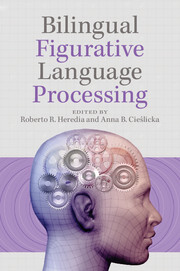Book contents
- Frontmatter
- Dedication
- Contents
- Contributors
- Acknowledgments
- Foreword
- Preface
- Section I Theoretical Implications
- Section II Methodological Approaches
- Section III Figurative Language Processing
- 6 Contrasting Bilingual and Monolingual Idiom Processing
- 7 Idiom Acquisition and Processing by Second/Foreign Language Learners
- 8 Neurophysiological Markers of Phrasal Verb Processing: Evidence from L1 and L2 Speakers
- 9 Irony Processing in L1 and L2: Same or Different?
- Section IV Cross-Linguistic Approaches and Applied Issues
- Author Index
- Subject Index
- References
8 - Neurophysiological Markers of Phrasal Verb Processing: Evidence from L1 and L2 Speakers
Published online by Cambridge University Press: 05 February 2015
- Frontmatter
- Dedication
- Contents
- Contributors
- Acknowledgments
- Foreword
- Preface
- Section I Theoretical Implications
- Section II Methodological Approaches
- Section III Figurative Language Processing
- 6 Contrasting Bilingual and Monolingual Idiom Processing
- 7 Idiom Acquisition and Processing by Second/Foreign Language Learners
- 8 Neurophysiological Markers of Phrasal Verb Processing: Evidence from L1 and L2 Speakers
- 9 Irony Processing in L1 and L2: Same or Different?
- Section IV Cross-Linguistic Approaches and Applied Issues
- Author Index
- Subject Index
- References
Summary
Abstract
Language is often ambiguous. For instance, verb-preposition strings such as look up can be interpreted either as a single verb + preposition combination leading to a literal interpretation (e.g., to look up the chimney), or can be interpreted as a so-called phrasal verb that requires a figurative interpretation (e.g., to look up the number). Past research has primarily used behavioral methodologies to investigate how first (L1) and second language (L2) learners deal with this phenomenon. However, event-related potentials (ERPs) are highly time sensitive and may shed additional light on this issue. In this chapter, we will first provide an overview of evidence on phrasal verb processing in L1 and L2 speakers. We will then present some of our own ERP data exploring phrasal verb processing in native speakers of English and native Arabic-speaking L2 learners of English. We will conclude with directions for future ERP research in this domain.
Keywords: bilingualism, event-related potentials (ERPs), figurative language, phrasal verbs, second language acquisition
Psycholinguistic research has a long tradition in exploring how native speakers successfully master the complexities encountered in everyday language. Lexical and structural ambiguities form a vital part of this complexity and are a frequent feature of language. For instance, multiword expressions such as phrasal verbs (e.g.,run into), which can have a figurative interpretation (e.g.,to meet), have been estimated by some to form about one-third of the English verb vocabulary (Li, Zhang, Niu, Jiang, & Srihari, 2003).
Information
- Type
- Chapter
- Information
- Bilingual Figurative Language Processing , pp. 245 - 267Publisher: Cambridge University PressPrint publication year: 2015
References
Accessibility standard: Unknown
Why this information is here
This section outlines the accessibility features of this content - including support for screen readers, full keyboard navigation and high-contrast display options. This may not be relevant for you.Accessibility Information
- 16
- Cited by
